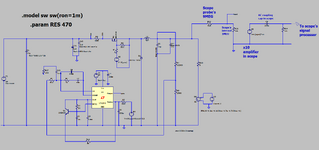cupoftea
Advanced Member level 6

Hi,
We need to do transient load testing on a 9Vin, 20Vout , 60W boost converter.
There is no need for any great transient response, since the 20V rail is just supplying some battery chargers.
We just want to check that the Boost doesn't become unstable after the transient.
Also, for the full load to no load transient, we want
to check that the vout does not go above 25V.
So do you agree that the scope should best be on DC coupling? It certainly answers all the questions that are needed to
be answered.
I have been places where they do transient load testing with scope on AC coupling
, and I never really saw the advantage. (unless of course the transient undershoot/overshoot
is like, 100mV and you just cant see it on DC coupling)
However, in our case, if the undershoot is <100mV, then its not of any importance anyway.
So , do you recommend AC or DC coupling for transient load testing?
We need to do transient load testing on a 9Vin, 20Vout , 60W boost converter.
There is no need for any great transient response, since the 20V rail is just supplying some battery chargers.
We just want to check that the Boost doesn't become unstable after the transient.
Also, for the full load to no load transient, we want
to check that the vout does not go above 25V.
So do you agree that the scope should best be on DC coupling? It certainly answers all the questions that are needed to
be answered.
I have been places where they do transient load testing with scope on AC coupling
, and I never really saw the advantage. (unless of course the transient undershoot/overshoot
is like, 100mV and you just cant see it on DC coupling)
However, in our case, if the undershoot is <100mV, then its not of any importance anyway.
So , do you recommend AC or DC coupling for transient load testing?

